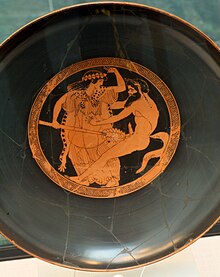
Back Satyrspiel ALS Сатирна драма Bulgarian Satyrspiel German Σατυρικό δράμα Greek Satirusa dramo Esperanto Drama satírico Spanish Satyyrinäytelmä Finnish Drame satyrique French Saterspul Frisian מחזה סאטירים HE

The satyr play is a form of Attic theatre performance related to both comedy and tragedy. It preserves theatrical elements of dialogue, actors speaking verse, a chorus that dances and sings, masks and costumes. Its relationship to tragedy is strong; satyr plays were written by tragedians, and satyr plays were performed in the Dionysian festival following the performance of a group of three tragedies. The satyr play's mythological-heroic stories and the style of language are similar to that of the tragedies. Its connection with comedy is also significant – it has similar plots, titles, themes, characters, and happy endings. The remarkable feature of the satyr play is the chorus of satyrs, with their costumes that focus on the phallus, and with their language, which uses wordplay, sexual innuendos, references to breasts, farting, erections, and other references that do not occur in tragedy. As Mark Griffith points out, the satyr play was "not merely a deeply traditional Dionysiac ritual, but also generally accepted as the most appropriate and satisfying conclusion to the city’s most complex and prestigious cultural event of the year."[1][2][3]
The satyric drama may be traced back to Pratinas of Phlius, c. 500 BC. After settling in Athens, he probably adapted the dithyramb, customary in his native home, with its chorus of satyrs, to complement the form of tragedy which had been recently invented in Athens. It met with approval and was further developed by his son Aristeas, by Choerilus, by Aeschylus, and others.
- ^ Shaw, Carl, A. Satyric Play; The Evolution of Greek Comedy and Satyr Drama. Oxford University Press. (2014). pp. 2–3. ISBN 9780199950942
- ^ Griffith, Mark. Greek Satyr Play; Five Studies. California. pp. 14–16. ISBN 9781939926043
- ^ Shaw (C. A.) "Satyric Play. The Evolution of Greek Comedy and Satyr Drama." The Classical Review, 65 (2014): 358–360. (Print). ISBN 978-0-19-995094-2. DOI: 10.1017/S0009840X15001250.
© MMXXIII Rich X Search. We shall prevail. All rights reserved. Rich X Search